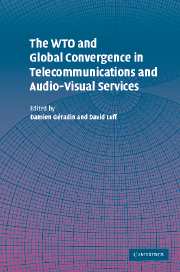Book contents
- Frontmatter
- Contents
- List of contributors
- Foreword
- Acknowledgments
- PART I Introduction
- PART II International regulation of telecommunications services
- PART III International regulation of audio-visual services
- PART IV Towards convergence?
- 11 Convergence: a reality check
- 12 Whither convergence: legal, regulatory and trade opportunism in telecommunications
- 13 Audio-visual and telecommunications services: a review of definitions under WTO law
- 14 Dealing with convergence at the international level
- 15 Overcoming the three digital divides
- Index
13 - Audio-visual and telecommunications services: a review of definitions under WTO law
from PART IV - Towards convergence?
Published online by Cambridge University Press: 25 February 2010
- Frontmatter
- Contents
- List of contributors
- Foreword
- Acknowledgments
- PART I Introduction
- PART II International regulation of telecommunications services
- PART III International regulation of audio-visual services
- PART IV Towards convergence?
- 11 Convergence: a reality check
- 12 Whither convergence: legal, regulatory and trade opportunism in telecommunications
- 13 Audio-visual and telecommunications services: a review of definitions under WTO law
- 14 Dealing with convergence at the international level
- 15 Overcoming the three digital divides
- Index
Summary
Introduction
This paper aims at reviewing the definitions given to the concept of telecommunications and audio-visual services in WTO instruments. In a first section, I will identify the instruments which contain useful information to address the issue. I will then analyse the content of the definitions (second section). In the third section, I will attempt to confront these definitions with developments in the markets. The issue is indeed to determine whether the definitions that may be found do correspond with the trend that is currently unfolding, and lead to a new information society industry where boundaries between traditional sectors (telecom, audio-visual, information) fade away.
Audio-visual and telecommunications services
Why make a distinction?
The first question to be asked is probably why a distinction should be made, on a legal basis, between audio-visual and telecommunications. Does the distinction really matter or is it purely theoretical with relevance for academics only? The answer should be straightforward. Dividing services into audio-visual and telecommunications is essential as it determines the legal regime that will apply to the activities.
Both activities are admittedly submitted to the General Agreement on Trade in Services (GATS). However, the GATS does not have as a consequence that all markets for services are suddenly and automatically open to world trade without any restriction. In practice, Members are invited to draft commitments, i.e. designate which markets they wish to open to foreign competition. They also have the possibility to put forward demands for exemptions that allow them to maintain some control on how and to what extent borders will effectively be opened.
- Type
- Chapter
- Information
- Publisher: Cambridge University PressPrint publication year: 2004



